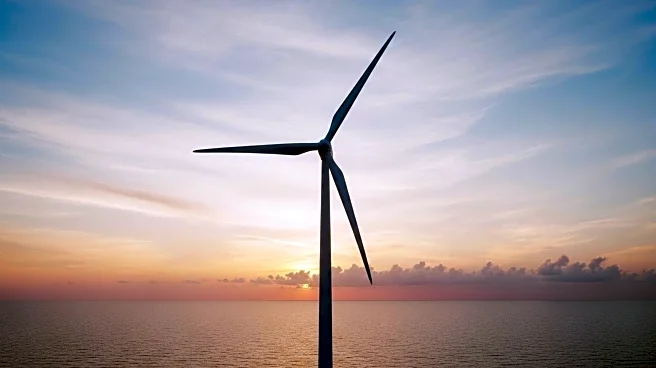What's Happening?
The Trump administration's recent actions against the offshore wind industry have led to legal challenges from Ørsted and several U.S. states. Ørsted, a major developer of offshore wind projects, filed a lawsuit in the District of Columbia seeking to overturn a stop-work order issued by the Department of the Interior for its Revolution Wind project. This project, a collaboration between Ørsted and BlackRock's Global Infrastructure Partners, was nearing completion when the order was issued. The administration has also targeted other projects, including Avangrid's New England Wind. The lawsuits argue that the administration's actions are arbitrary and lack statutory authority. Connecticut and Rhode Island have joined the legal battle, with their attorneys general criticizing the administration's approach as illegal and reckless.
Why It's Important?
The legal challenges against the Trump administration's actions have significant implications for the U.S. renewable energy sector, particularly the offshore wind industry. These projects represent substantial investments and are crucial for meeting renewable energy targets. The administration's halt on these projects could delay progress in transitioning to cleaner energy sources, impacting economic growth and job creation in the sector. The lawsuits highlight tensions between federal and state governments over energy policy, with states advocating for continued development of renewable energy infrastructure. The outcome of these legal battles could set precedents for future energy projects and influence the regulatory environment for renewable energy in the U.S.
What's Next?
The court's decision on these lawsuits will be pivotal in determining the future of offshore wind projects in the U.S. If the court sides with Ørsted and the states, it could lead to the resumption of halted projects and potentially influence the administration's approach to renewable energy policy. The Department of Justice is expected to act by October 10 to address the approval of the New England Wind project's Construction and Operations Plan. Stakeholders in the renewable energy sector, including companies and state governments, will be closely monitoring these developments, as they could impact investment strategies and project timelines.
Beyond the Headlines
The legal challenges against the Trump administration's actions on offshore wind projects underscore broader issues in U.S. energy policy, including the balance between federal authority and state initiatives. The administration's focus on national defense concerns and economic viability of wind energy without federal aid raises questions about the prioritization of energy sources and the role of government support in fostering industry growth. These developments may also influence public perception of renewable energy and its integration into the national energy strategy.










